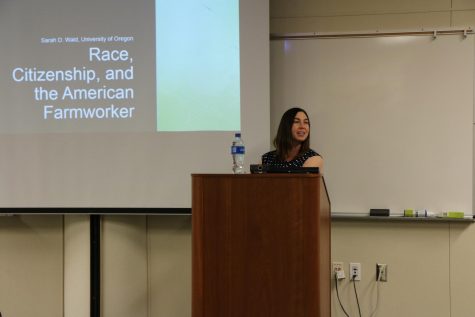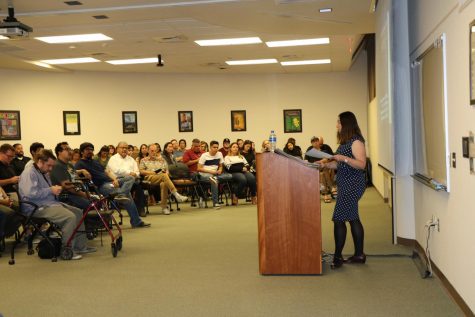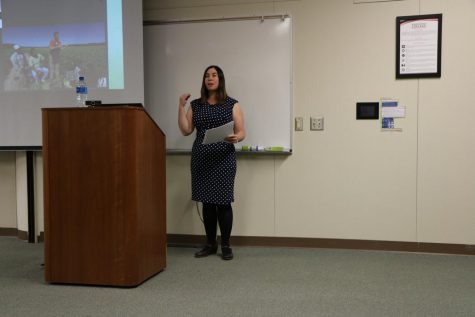Author of “ The Nature of California,” Sarah Wald speaks at the Levan Center
October 26, 2018
The Levan Center at Bakersfield College hosted guest speaker Sarah Wald on Thursday, Oct. 18. Wald, Associate professor of English and Environmental Studies at the University of Oregon, gave a presentation on her book, “The Nature of California: Race, Citizenship, and Farming since the Dust Bowl.”

Guest speaker, Sarah Wald, PhD, gives a presentation on her book “The Nature of California: Race, Citizenship, and Farming since the Dust Bowl.”
Wald discussed her book “The Nature of California: Race, Citizenship, and Farming since the Dust Bowl,” and had a Q&A session afterward.
Wald featured commercials, books and other forms of media to explain how the ‘American farmworker’ has been perceived and made a distinction between a farm laborer and a farmworker.
Wald said she chose a Ph.D. in American Studies to answer questions she had regarding race and political views.
“I wanted to understand how our particular ideas about belonging and identity were shapingsome of the political conflicts that were happening and maybe find some better solutions than I was finding in my organizing work, so in some ways I thought it would help me be a better organizer,” she said.
Wald said the most important information she hopes the audience takes away is that it is “not enough to look at representation of farmers” and to realize there is literature and art created by farmworkers and “farm working communities have a lot of knowledge and worldviews that people who aren’t farmworkers can learn from,” she said.
According to Andrew Bond, Associate professor of English, the speech is part of the Energizing Humanities in California’s San Joaquin Valley grant. The $100,000 grant is funded by the National Endowment for the Humanities’ Initiatives at Community Colleges (NEH).

Sarah Wald talks about her book, “The Nature of California: Race, Citizenship, and Farming since the Dust Bowl,” to BC students, faculty and community members.
The three-year grant program directed by Andrew Bond, Oliver Rosales, and Joshua Ottum aims to promote cultural competency in humanities instruction at BC.
Bond chose to invite Wald because of her work in environmental studies.
“Her work in environmental studies, English and environmental humanities really details a lot of the issues that our grant is trying to address, basically our grant program is focused on place-based kind education and pedagogy so encouraging instruction that focuses on what’s local to get students engaged with their own kind of like histories and cultures at the college level in order to foster kind of a better understanding of how they fit into the kind of cultural ecosystem that is Bakersfield and Kern County,” he said.

Sarah Wald gives a prepared speech at the Norman Levan Center on Thursday Oct. 18 to BC students, faculty and community members.
Additionally, Bond said Wald covers representation of farmworkers in her book.
“So, because her work deals with; in particular the representation of farmworkers in literature and other media, I thought that it would be interesting bringing her in and her book The Nature of California really covers a lot of that as well,” he said.
Joshua Ottum, Commercial Music professor, said the first event Thursday is part of the second year of the grant. Ottum added the grant was aimed at BC faculty.
“So, the way the grant was put together is essentially aimed at building humanities at the community college level, so it’s actually aimed at faculty; most events start with a public event on a Thursday night and that’s what tomorrow is…and it really aims at helping community college humanities faculty grow their curriculum, think about new ways to instruct,” he said.
Oliver Rosales, Professor of History and Faculty Coordinator, Social Justice Institute at BC, said the NEH grant funds are for faculty professional development and public programs and that there will be a public conference at the end of the grant.
“BC will host a regional interdisciplinary humanities conference that will be open to the public. The grant provides BC faculty with funds to help develop the human capacity of faculty to do place-based pedagogy and teaching strategies that utilize the cultural capital of the students and region within the classroom. The project directors believe that by inserting the local into [the] curriculum, we can help close achievement gaps and get students and young peopleexcited about education, as well as involve the ‘community’ in our community college,” he said.




